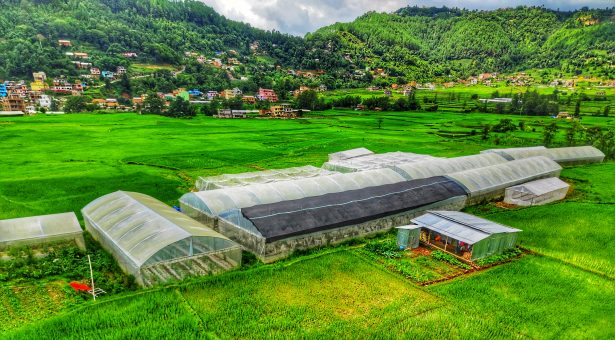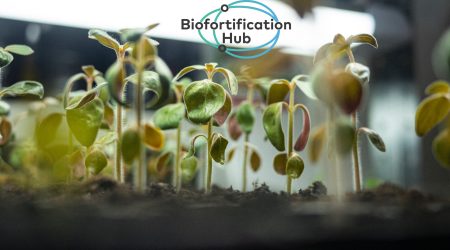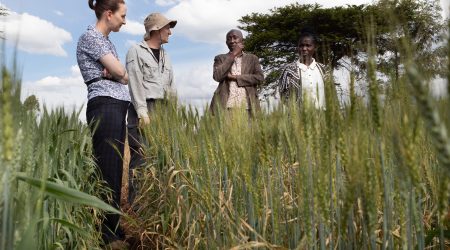From Kale to Kathmandu

Sharing the knowledge we gain is an important and rewarding part of being a scientist.
Recent work between plant pathologists at the John Innes Centre and plant breeding companies in the UK and Nepal are a great example. By working together, we can share technical skills, knowledge and experiences, in order to help tackle some of the most challenging global problems.
Agricultural instability is a problem in Nepal, in part because local farmers lack access to high quality vegetable seeds. In turn this contributes to malnutrition and currently half of all children in Nepal are classed as underweight.
Previously, Nepalese seed companies have bought in all their seed from other countries which means it has not been bred for the Nepalese environment
Sarba Shrestha Seeds Pvt Ltd (SS Seeds) is the first vegetable breeding company in Nepal and first started producing hybrid tomato seed in 2017 before moving on to cucumbers. Ultimately their goal is to produce a range of high-quality vegetable seeds for the Nepalese market with traits local farmers find desirable. They have been exploring local varieties and undertaking trials and want to ensure Nepal has a stable supply of seed without having to rely on imported seed.
The third partner in the project is CN Seeds, a UK seed breeder specialising in the production of baby leaf salad and herbs. CN Seeds and the John Innes Centre have been collaborating for several years with the aim of developing salad crops resistant to downy mildew for the UK market. With the development of disease-free hybrids now well underway the team wanted to use their knowledge to support and advise SS Seeds in Nepal.
In the future, SS Seeds plans to develop hybrid seed for vegetable brassicas, such as broccoli, cabbage and cauliflower. Interactions between CN Seeds and John Innes Centre scientists will help them to achieve reliable disease-free hybrids of these crops.
Dr Francesca Stefanato from the Crop Genetics Department worked with CN Seeds and SS Seeds in Nepal during April 2019, supported by a BBSRC ‘Transforming Food’ project, and a Flexible Talent Award.
Francesca gained experience of working with industry, including method development skills for translating laboratory protocols into simple methods that could be performed in commercial laboratories. She developed methods with CN Seeds to allow in house pathology testing and treatment of seed lots and shared her knowledge post-harvest physiology
As part of Francesca’s work in Nepal she visited the laboratories of, and presented to, the Nepal Agricultural Research Council, where she presented the research that takes place at the John Innes Centre, the objectives of the projects she worked on with CN Seeds and SS Seeds and highlighting to students in Nepal, the opportunities at the John Innes Centre such as the Janaki Ammal Scholarship for PhD students.
The collaboration with SS seeds and, in particular, Francesca’s visit to them has also helped to raise the company’s profile with the Nepal Agricultural Research Council, paving the way for them to interact more closely in the future and attract further investment for the company.
In October 2019 SS Seeds’ Prabesh Shrestha and Sabina Manandhar travelled from Nepal to the UK for a month-long visit to CN Seeds and the John Innes Centre, allowing them to further develop ideas, skills and techniques which will be valuable to their business.
As part of their visit Prabesh and Sabina gave a presentation to the Norwich Research Park on their challenges and experiences developing their business and the value of the interactions with scientists from CN Seeds and the John Innes Centre.
SS Seeds are keen to develop their own plant pathology laboratories to allow in house seed testing and Francesca, the JIC team and CN Seeds have been able to share methodology and provide advice which will allow them to identify, screen and breed pathogen free Brassica crops in Nepal.
Francesca used the Flexible Talent Mobility Account to give her experiences of working in industry and Dr Chris Ridout received funding through the BBSRCs GCRF I-FLIP to support visits between Nepal and the UK.
There are a range of grants and funding opportunities which you can apply for to help translate your research so that others can take value from it, contact our Knowledge Exchange and Commercialisation team for more details.



